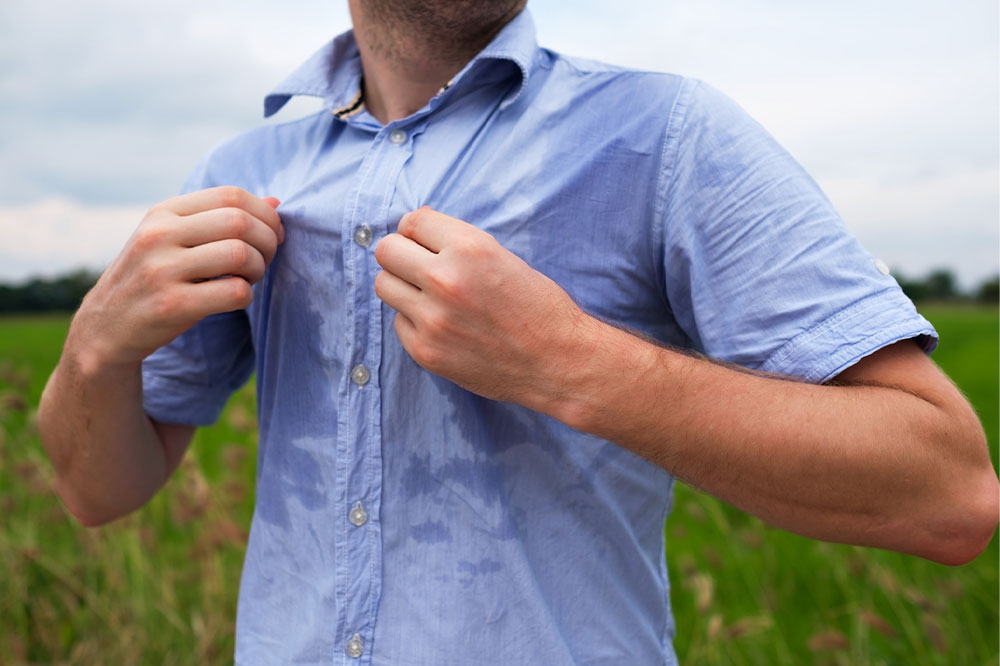
Hyperhidrosis – Causes, symptoms, and management
Hyperhidrosis is a condition where the body produces more sweat than it normally should. It is not because of scorching weather or a strenuous workout, but it seems like a normal function for the body. The excessive sweat produced by the sweat glands can easily embarrass one in social gatherings, at work, or even at events. This article shares some insight on hyperhidrosis for you to better understand the condition and help you overcome it.
Causes of hyperhidrosis
High temperature
When the body’s temperature rises, the sweat glands start producing sweat to cool off the body. Sweating is the body’s mechanism to bring down the body’s temperature. While this is how a normal person’s body would react, the sweat glands of a hyperhidrosis patient become overactive.
Nervousness and anxiety
Besides a temperature rise, humans tend to sweat even when anxious or nervous. And in the case of hyperhidrosis, the person may tend to sweat unusually more when they are nervous.
Certain odors and foods
Foods that are spicy, citric, or beverages and foods high in caffeine can cause excessive sweating in hyperhidrosis patients. So, avoid foods like coffee, chocolate, peanut butter, oranges, pineapple, berries, and spices.
Hereditary
Focal hyperhidrosis comes with a genetic link, and that’s why it’s common that people from the same family may have similar symptoms.
Secondary hyperhidrosis
This condition occurs when a person may sweat excessively due to a medical condition. This is not very common, but there are many medical conditions that can cause excessive sweating, and they include:
- Diabetes
- Low blood sugar
- Heart attack
- Nervous system disorders
- Thyroid
- Menopause
Symptoms of hyperhidrosis
This uncomfortable condition can cause a myriad of symptoms that can be too sensitive for people to talk about publicly.
- It is common to see sweat marks around the arms and the back.
- The face and chest can also turn sweaty to a point where the clothes may start dripping with sweat.
- Bad body odor is another big problem for people with this condition.
- Sweat can leave marks on the clothing, turning a white tee yellow around the arms and the back.
- Constant sweat and bacteria on the skin can cause the skin to age faster, causing wrinkles and discoloration.
- People with this condition may also sweat during sleep, wetting the bedsheet as well as the mattress.
Complications related to hyperhidrosis
The sweat that constantly accumulates on the skin brings a ton of bacteria that can easily turn into an infection over time. Other than that, it can impact a person’s mental health, given that it comes with social discomfort and embarrassment. Many people affected with this condition limit their interaction with other people, causing them to be isolated from their circle at school, university, or even at work. Therefore, when symptoms of hyperhidrosis start showing, it is best to have them checked while looking for prevention methods and possibly a permanent cure. Parents should lookout for signs of hyperhidrosis that could easily influence the mental wellbeing of a growing child.
Tricks to manage hyperhidrosis
- Always carry a change of clothes everywhere you go, as athletes and gym-goers do. Dedicate some space in your office desk or locker to keep a fresh pair of pants, shirt, and even socks.
- Wear dark-colored clothing to prevent the sweat from showing prominently, and you also save your shirt or blouse from discoloration.
- Wear breathable fabrics like 100% cotton or linen. They make one perspire less and they dry out easily.
- Shower more than once a day. Develop a habit to shower after you get home, be it a grocery run, work, or just a stroll. This helps eradicate all the unwanted bacteria that tags along with sweat.
- Use clinical-grade cloth wipes that can help with reducing armpit sweating. They come in a single-use package, like tampons, so it’s easy to carry and handle in public places. Remember to always carry and store some at the workplace.
- Make social plans in the evening, after the sun goes down, so the temperature is a lot cooler.
- Use strong antiperspirants that keep the sweat glands from producing more sweat; however, don’t overuse these as they come with their own side effects.
Talk to a doctor about hyperhidrosis to further understand the symptoms, causes, and complications better. We recommend getting immediate tests and moving on to treatment options to help overcome the condition.




